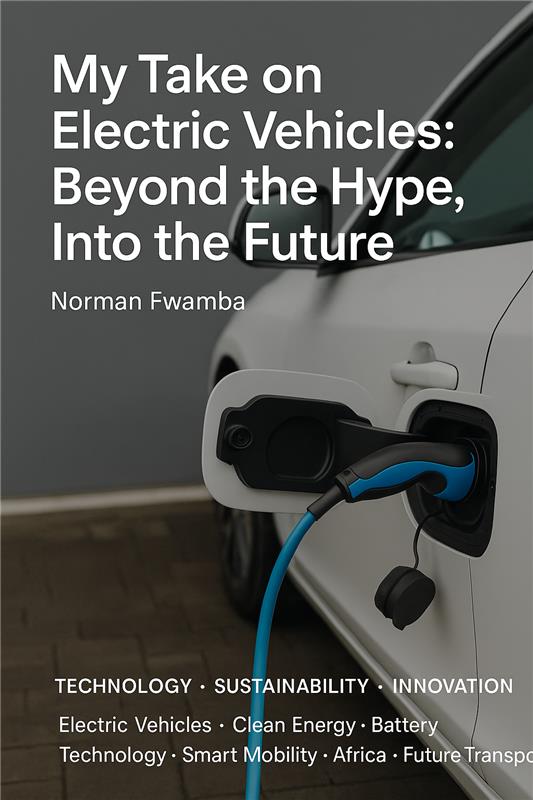My Take on Electric Vehicles: Beyond the Hype, Into the Future

If I had to describe the current state of electric vehicles (EVs) in one word, it would be inevitable. Whether you’re a die-hard petrolhead or a curious technophile, it’s hard to deny that we’re witnessing a major shift in how we move from point A to B. As someone who’s both a technologist and a realist, I’ve found myself asking not just what EVs are, but what they mean for us, for our cities, and for the future.
The EV Shift: More Than a Trend
Electric vehicles aren’t just the flavor of the month. They’re the result of decades of engineering ambition, environmental urgency, and market evolution. I see EVs as the clearest sign yet that we’re willing to rethink systems we’ve clung to for over a century. This isn’t just about swapping gas pumps for charging ports it’s about transforming entire ecosystems.
Think about it. EVs touch on energy policy, urban planning, climate action, and even data science. They’re not just products; they’re platforms. And that’s what excites me.
The Climate Imperative
Let’s address the elephant in the room: climate change. Internal combustion engine vehicles have long been a major contributor to greenhouse gas emissions. EVs, by contrast, promise a cleaner path but with an asterisk.
Yes, EVs reduce tailpipe emissions to zero. But that doesn’t automatically mean they’re carbon neutral. The source of electricity matters. A coal-powered EV is not much better than a fuel-powered car. So, the real promise of EVs lies in coupling them with renewable energy sources.
That said, I believe EVs are a necessary stepping stone one that forces us to have larger conversations about sustainable grids, battery recycling, and smarter transportation.
The Battery Question
Here’s where it gets tricky and interesting.
Battery production, particularly lithium-ion, isn’t without its controversies: mining, energy intensity, and end-of-life recycling are all real issues. But innovation is rapidly catching up. Solid-state batteries, for example, promise longer range, faster charging, and safer operation.
In a way, the battery story reminds me of the early days of computing: bulky, flawed, expensive but essential. We didn’t stop using computers because early models were inefficient. We iterated. And we will do the same here.
From Driving to Computing
One of the most fascinating shifts EVs bring is the digitization of driving. Teslas, Rivians, BYDs these are essentially computers on wheels. They come with over-the-air updates, advanced telemetry, and AI-assisted driving.
This changes how we think of cars. No longer are they just machines we own; they become platforms we interact with, systems that evolve. For someone who thrives on software thinking, I find this deeply compelling.
EVs also pave the way for autonomous driving, vehicle-to-grid communication, and shared mobility models. In short, EVs are not the end goal they’re the infrastructure of a smarter mobility future.
The African Context: Realities and Roadmaps
Now, let’s bring this closer to home.
In many parts of Africa Kenya included EVs are still a novelty. Range anxiety is real. Charging infrastructure is limited. And affordability? Still a barrier.
But that’s precisely why this is the moment to start planning smart. I’m encouraged by local startups converting traditional vehicles into electric ones, and by the government’s increasing interest in green mobility policies. The key is not just to import solutions, but to build local ecosystems from battery assembly to solar-powered charging stations.
What I’ve Learned
Here’s what my journey into the EV world has taught me:
- Don’t just think cars; think systems. EVs are part of a broader energy and data ecosystem.
- Adoption isn’t linear. Early frustrations (like limited range or charging time) are not signs of failure; they’re invitations to innovate.
- Policy matters. Without supportive legislation, subsidies, and infrastructure, EVs won’t go far literally or figuratively.
- Everyone has a role. Engineers, data analysts, city planners, everyday drivers we all shape the transition.
Final Thoughts
Electric vehicles are not perfect. But perfection was never the point. Progress was.
I believe EVs symbolize humanity’s ability to rethink, retool, and recommit to better futures. They’re fast, smart, clean(er), and full of possibility. The question is no longer if we’ll go electric it’s how quickly we’ll do it, and how smartly we’ll design the road ahead.
For me, EVs aren’t just about what we drive they’re about where we’re going.
